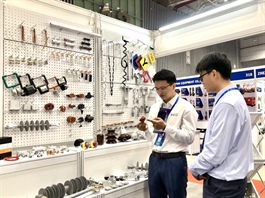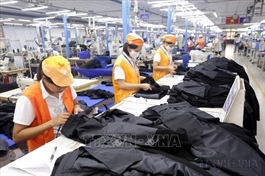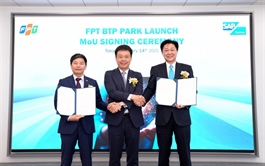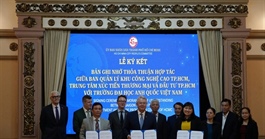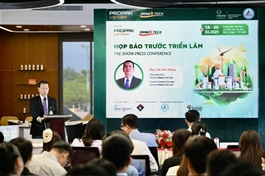Technology primed as next modern growth driver
Technology primed as next modern growth driver
Obstacles in funding sci-tech projects could soon be resolved to release resources and create momentum for the country’s economic growth.

Ministries are working to draft rules for spending in technology, innovation, and the digital transition, Photo: Shutterstock |
At last week’s conference on science, technology, innovation, and human resources, Minister of Information and Communications Nguyen Manh Hung said that growth by traditional drivers had gradually reached its limit. Vietnam’s economy can grow up to 7 per cent by traditional drivers, but finding new drivers is essential for the higher growth rate, which can only come from these areas.
“Agriculture has helped Vietnam escape poverty. Foreign investment, and industrial development have enabled the country to become an upper middle-income country. To become a high-income country, we must rely on science and technology, innovation, and digital transformation. These three factors are the main drivers to develop modern productive forces, perfect production relations, innovate national governance methods, develop the socioeconomic landscape and become rich,” he said.
According to Hung, science and technology would contribute to the country’s economic growth if research outcomes could be commercialised. So these outcomes, funded by state budget, should be owned by research institutions.
“To stimulate the creativity, scientists and engineers should enjoy about 30-50 per cent of commercialised gains, while the state can benefit from taxes and jobs after research results commercialised and generating revenue and profit,” he said.
Hung proposed that the state accept risks in research, along with risk management solutions, such as budget allocation and management of research results by stage, classification, and risk levels. “We can change awareness and the way of doing very soon, right in the first half of this year, by amending the Law on Science and Technology and other relevant legislation,” he said.
Minister of Science and Technology Huynh Thanh Dat emphasised removing difficulties in sci-tech and innovation activities to submit in the draft decree to the National Assembly for approval at this month’s meeting, including piloting policies related to assets formed from research using the state budget, and policies for developing the market.
“The law is being revised to institutionalise the Party’s policies. Moreover, a decree including content on innovation and creative startups is being built to create a legal basis for the establishment and strong development of innovation centres and organisations, supporting innovation and creative startups in application, technology transfer, and innovation. These will be submitted to the government in the first quarter,” Dat said.
The Ministry of Information and Communications has proposed the appointment of contractors and shortening the process of digital transformation projects.
“The state should assign tasks and place orders to master strategic technologies and large digital transformation projects, increase the budget for hiring IT services, develop a cloud computing centre exclusively to support such a transformation at authorities, build a high-performance AI computing centre, and fund 30 per cent of the first semiconductor factory in Vietnam,” Hung said.
Minister of Finance Nguyen Van Thang proposed to amend the Law on Science and Technology and stipulate that the Ministry of Finance (MoF) allocates enough state budget for this.
“Based on the total assigned budget, the Ministry of Science and Technology (MoST) and related authorities at all levels develop a plan for budget allocation, management, use, and expense, ensuring compliance with the goals and orientations for this development,” Thang said. “We should strengthen decentralisation, autonomy and responsibility to research organisations in reviewing, approving and using the state budget for sci-tech and innovation.”
The MoF is working with the MoST in drafting a resolution of the National Assembly on pilot policies for related spending. The MoF is reviewing and proposing amendments to the Law on the State Budget that will collect comments and proposals of relevant ministries and agencies on financial mobilisation and the budget.
The MoF is submitting revised documents for the Law on Corporate Income Tax, and Personal Income Tax, including proposals for corporate income tax incentives for investment in small and medium-sized technical and service facilities, incubators, and personal income tax incentives for high-tech employees.
“We will build tax sandboxes, allowing testing of new, more flexible tax policies to support development, regularly reviewing, updating, and adjusting tax policies to suit the development of sci-tech and digital transformation,” Minister Thang said.
According to the MoF, the state budget allocation for 2021-2025 for innovation and the digital transition is allocated with integrated funding from different sources. However, spending in this area is still modest, at 1.39 per cent in 2023, 1.97 per cent in 2024, and expected to reach 2 per cent this year.
Moreover, the current state budget spending on sci-tech is noted in many laws, including the Law on Science and Technology, the Law on the State Budget, the Law on Public Investment. The regulations on spending are also inconsistent, causing difficulties in arranging and allocating capital sources, and settling projects.
|
Marc Woo, CEO, Google Vietnam I highly appreciate the ambitious science and technology goals of the Vietnamese government. For us, Vietnam is an important partner, and AI has been developing very well here. However, for rapid growth, we need a high-skilled workforce, talent, and businesses that are proficient in AI technology. Specifically, there are four promising lands for cooperation. The first space is AI models. Google has spent plenty of resources building large language models, which need to be trained by data sources, especially diverse and high-qualified Vietnamese people. To develop the workforce, we will continue to provide scholarships and AI skills training programmes for individuals. Students and teachers need AI-supported learning and teaching tools. We are willing to provide free access to Google Works, Google Space, and Google Classroom, which will support young people to use AI at an early age. We welcome and highlight that the government plays an important and pivotal role in supporting and development of AI applications. Based on Google’s practical experience working in many countries, we positively acknowledge that the government is building an open national dataset and allowing businesses to build useful and responsible AI applications based on this dataset. We can exchange and share experience with the Vietnamese government. If working together, we will achieve many good results for Vietnam, and enable it to enter a new era of national development. Suk Ji-won, general director Samsung R&D Centre Vietnam Samsung is interested in training science and technology talents in Vietnam. We have awarded 875 scholarships to talented IT students, provided programming courses for more than 25,000 students, and internships at the centre for about 2,400 Vietnamese students. Samsung has sponsored labs and provided more than 700 computers to universities to improve the IT training environment, and sponsored programming competitions for students. The Samsung Innovation Campus programme offers free courses on the Internet of Things, AI, big data, and coding and programming. Since 2019, more than 12,000 students have participated. We will do the utmost to train high-quality personnel by expanding and specialising cooperation initiatives with universities in talent training activities. I suggest the Vietnamese government builds a high-skilled and professional workforce in AI and semiconductors. The government should issue incentive policies to recruit foreign managers and experts for training and nurturing talents such as visa support policies or tax exemptions, as well as housing, healthcare, and education support policies for families of foreign experts. These will be essential conditions for them to participate in training talents for a long-term in Vietnam. I hope that these policies will also be applied to excellent workers selected by Vietnamese authorities and organisations, and also experts sent by enterprises to Vietnam to work on high-tech projects. In addition, the country also needs to improve the investment environment to encourage foreign-invested enterprises investing in high-tech industries such as AI and semiconductors. I believe that if the government continues to improve the investment environment by simplifying licensing procedures and providing preferential policies for foreign-invested enterprises in high-tech projects, the country will become a hub for the high-tech industry. Vu Manh Cuong, director, Nvidia Vietnam Vietnam will need hundreds of thousands of AI engineers within the next three years as it is facing a shortage of personnel at all levels and in various fields such as data science and AI operations. When AI is applied to specialised fields like biology, medicine, banking, and telecommunications, Vietnam will need even more scientists and engineers mastering AI technologies. Nvidia launched the Deep Learning Institute, offering free curricula, tools, and cloud-based graphic processing resources for universities to train students in six components, including machine learning, data science, and large language models. We are working with many local universities and businesses, such as Hanoi University of Science and Technology, Vietnam National University, Danang University, Duy Tan University, Posts and Telecommunications Institute of Technology, and FPT University to train students. Nvidia can train a large number of personnel and the programme covers three areas: upscaling and reskilling IT workers in public agencies, businesses, and startups; training students; and providing high-quality training for top talents. However, the government should support more new schemes, in addition to orders from large companies like Viettel and FPT, for AI training and support for instructors. Funding is necessary to train large numbers of people. |
- 16:00 21/02/2025








